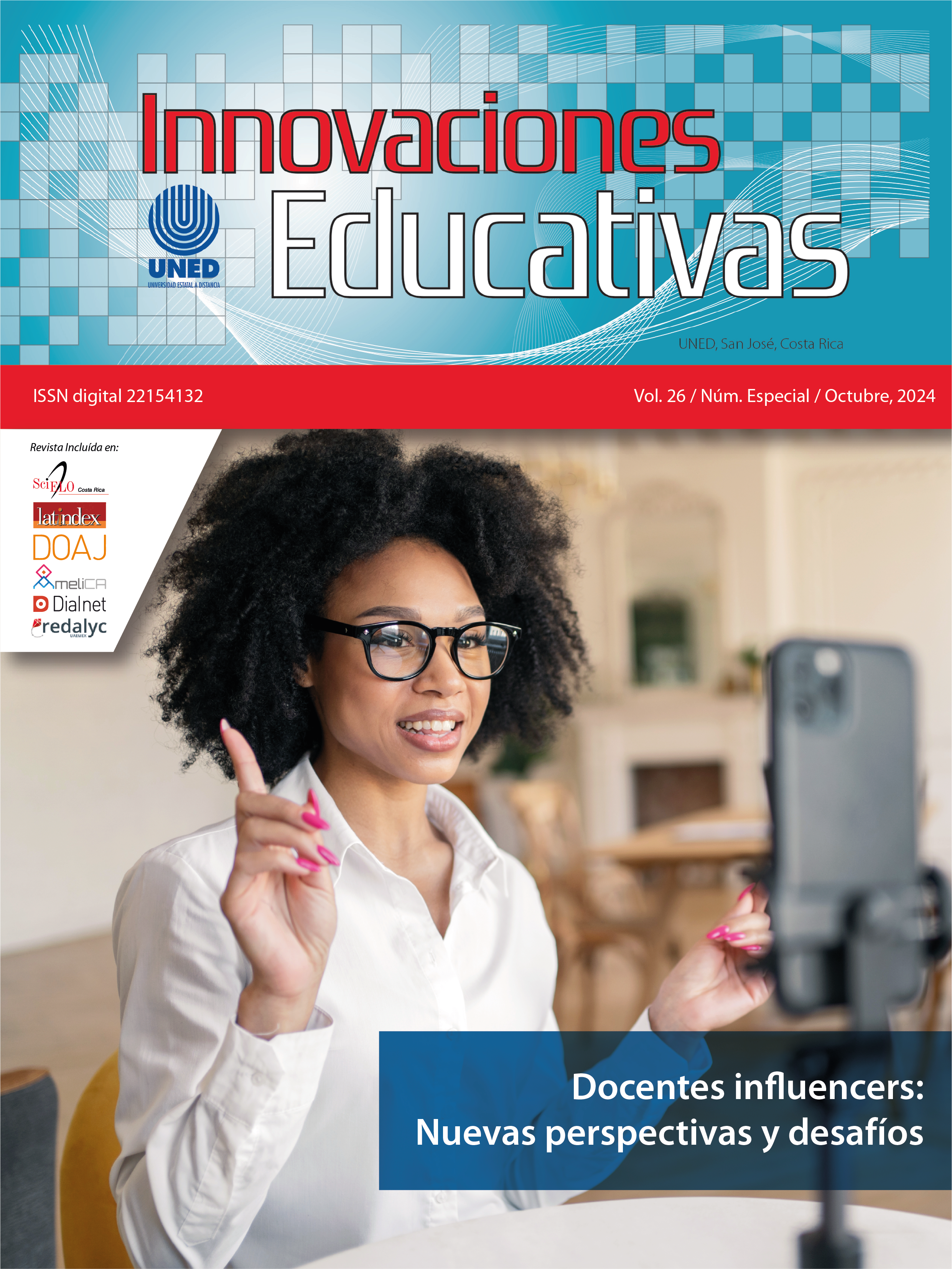Podcasts: An Innovative Teaching-Learning Experience for High School Students in Antofagasta to Reflect on Their Post-COVID Experiences.
DOI:
https://doi.org/10.22458/ie.v26iEspecial.5359Keywords:
Educational Radio, Media Education, Digital Literacy, Educational TechnologyAbstract
This article presents a teaching experience based on good practice and innovation that explores the use of podcasts as a pedagogical strategy in the teaching-learning process. The experience consisted of a series of podcasts created by eighth grade students from the city of Antofagasta, Chile, in which they shared their experiences and reflections after the COVID-19 confinement. The methodology was implemented during an intensive and voluntary extracurricular workshop that took place from 7 to 11 November 2022. The students learned all the elements that make up the radio language to create podcasts. They also learned how to edit their radio productions and listened to and commented on their podcasts in groups to understand the usefulness of this format in their own processes. In this way, they became familiar with the radio format, created scripts, recorded, edited and listened to their own productions. The result was nine podcasts. Although the initial topics varied, the activity was positively evaluated by the students, confirming its effectiveness. It is therefore a significant contribution to pedagogical change, providing students with a new tool to produce their own content. From this experience it can be concluded that this tool can be useful for both teachers and students, provided that it is based on a didactic planning process. It is crucial to bear in mind that the podcasts must be driven by the students' intrinsic motivation, avoiding an external and adult-centred perspective.
References
Almendingen, K., Torbjørnsen, A., Sparboe-Nilsen, B., Kvarme, L.G., y Šaltytė Benth, J. (2021). Small Group Student-Produced Podcasts Were Favored as Assignment Tool for Large-Scale Interprofessional Learning: An Exploratory Study Among Health, Social Care, and Teacher Education Program. Journal Frontiers in Education, 6. https://doi.org/10.3389/feduc.2021.622716
Asociación de Agencias de Medios. (2021). Estudio Audio 2021: Consumo en Chile off-on. https://bit.ly/4bhzbPr
Barrios-Rubio, A. y Gutiérrez-García, M. (2021). Prácticas juveniles de consumo sonoro, entre grandes plataformas y el ecosistema radiofónico: caso Colombia-España. Comunicación Y Sociedad, 1-24. https://doi.org/10.32870/cys.v2021.7820
Brandt T., C. (2023). Estudio de Audio Digital 2023. RDFMedia. https://bit.ly/3VIzm0i
Cunha, a. P. S. Da; Silva, l. P. (2024). Relato de experiência reflexivo de estágio supervisionado: prototipação da proposta didática de utilização de podcast como ferramenta educativa. Olhar de profesor, 27. https://doi.org/10.5212/OlharProfr.v.27.22151.004
Edison Research. (2023). Kids Podcast Listener Report y Kids Listen. Public Media, Disney Podcasts, Tumble Media y Wondery. https://bit.ly/3KX5mZM
García-Aretio, L. (2022). Radio, televisión, audio y vídeo en educación. Funciones y posibilidades, potenciadas por el COVID-19. RIED. Revista Iberoamericana De Educación a Distancia, 25(1), 09-28. https://doi.org/10.5944/ried.25.1.31468
Hidalgo-Sosa, M. y Quintero-López, I. (2022). El podcast en pandemia: herramienta para la enseñanza y aprendizaje en bachillerato, una mirada constructivista. Conrado, 18(85), 372-377. https://conrado.ucf.edu.cu/index.php/conrado/article/view/2304
Instituto Nacional de Estadísticas de Chile. (2018). XIX Censo nacional de población y VIII de vivienda de Chile. https://bit.ly/3MLZ1RN
Kervin, L. y Vardy, J. (2007). Look who’s talking: Incorporating iPods in the classroom. Screen Education (48), 58-64. https://shorturl.at/mPL6A
Motsaathebe, G. (2024). Evolving Trends in Radio Broadcasting in South Africa: The Case of Podcast and Chill with macg. En Nkoala, S., Motsaathebe, G. (Eds.), 100 Years of Radio in South Africa, 2. Palgrave Macmillan, Cham. https://doi.org/10.1007/978-3-031-40706-2_10
Naciones Unidas. (1989). Convención de las Naciones Unidas sobre los Derechos del Niño. https://shorturl.at/Fgdi0
Nielsen, W., Georgiou, H., Jones, P. y Turney, A. (2020). Digital Explanation as Assessment in University Science. Res Sci Educ 50, 2391–2418. https://doi.org/10.1007/s11165-018-9785-9
Órdenes, X., Roberts, R., Rojas, F. y Rojas, P. (2023). Estrategia de transformación digital: Chile Digital 2035. CEPAL. https://bit.ly/4dS6p9V
Radios Libres. (enero de 2022). Taller de podcast. Cómo contar historias con sonido [Curso virtual N°29]. https://bit.ly/3McOVt1
Reynoso-Díaz, A., Zepeda-Ortega, I. E. y Rodríguez, R. R. (2016). Podcast educativo para aprender a aprender, aprender a hacer y aprender a ser. UNAM.
Reynoso-Díaz, A., Zepeda-Ortega, I. E. y Rodríguez, R. R. (2019). Podcast educativo: Planeación, Análisis, Diseño y Evaluación. Colegio de Ciencias y Humanidades. Plantel Sur. https://shorturl.at/OTg88
Samino-García, R., Manera-Bassa, J., Rodríguez-Herráez, B. y Rivero-Gutiérrez, L. (2013). El podcast adaptado al entorno educativo como recurso innovador para el aprendizaje. En J. J. García Machado (Eds.), Descubriendo nuevos horizontes en administración (pp. 5-6). XXVII Congreso Anual AEDEM, Universidad de Huelva.
VTR Banda Ancha, EducarChile y Adimark. (2009). Estudio Índice Generación Digital 2004-2008. Radiografía de la digitalización de los niños chilenos. Gobierno de Chile. https://bit.ly/46V0miB
West, M. y Vosloo, S. (2013). Directrices para las políticas de aprendizaje móvil. UNESCO. https://shorturl.at/A5Tgj
Yzidi, F. Z. (2018). El podcast como herramienta creativa para desarrollar el aprendizaje y autoaprendizaje del E/LE. Trans, Internet journal for cultural studies, 23. https://bit.ly/3HPn8Mi
Downloads
Published
How to Cite
Issue
Section
License
Copyright (c) 2024 Innovaciones Educativas

This work is licensed under a Creative Commons Attribution-NonCommercial-NoDerivatives 4.0 International License.

